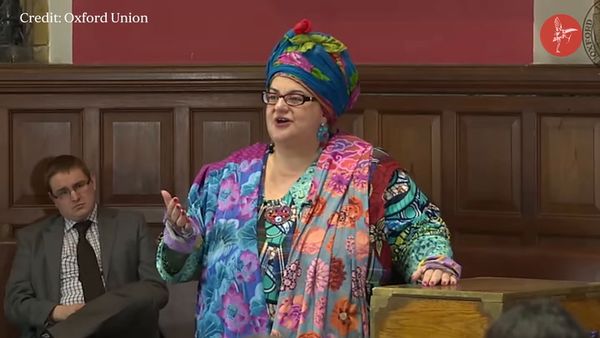
I never knew what to expect when I rang the bell beside the sturdy double doors on Decima Street. This was Kids Company, 2004. Young teenagers, long excluded from school, happily making each other sandwiches in the canteen or hot chocolate with luxurious spoonfuls of sugar stirred in. An older lad, high and enraged, ramming the bolted door after the security guard had barred him for threatening behaviour. The founder of the charity, Camila Batmanghelidjh, venting her frustration at the pace of state bureaucracy as she tried to find a bed for that night for a girl who had run away from her abusive stepfather.
I visited regularly over the years, first as a journalist researching my book about modern childhood and later as a volunteer. Back then, despite the chaos and the flares of violence, there was a heady sense that behind those double doors something magical was happening – and that mustn’t be forgotten in the controversies that surrounded the charity’s collapse a decade later.
Policymakers across the political spectrum, celebrity funders and families around south London were talking about Batmanghelidjh, who died at the age of 61 on New Year’s Day, and how she was succeeding with the very worst cases where other agencies failed.
She said it was because she and her staff met these children where they lived – “at street level”, as she liked to put it. “A child who has been terrorised and neglected isn’t going to feel threatened by punishment,” she once told me. “Loving care surprises them more.”
What did that look like in practice? Batmanghelidjh believed profoundly that love is a doing word. Hot meals, routine, a safe space to come and be listened to, clothing and daily necessities. And hopeful, inspired staff who could do the work they had trained for, free from the numbing constraints of mainstream care policy.
I spent a lot of time with a boy named Ashley. Just 15, he was already a small-scale drug dealer with a history of gun-related violence. When Ashley told me he had seen it all, unfortunately I believed him.
Ashley was hostile towards professionals who offered help without, as he saw it, bothering to understand what he needed, but I remember him melting like butter when Batmanghelidjh came into the room. She was like his second mum, he told me.

Ashley got a cash allowance from Kids Company – though it was a tenner for crisps and a takeaway, rather than the splashy amounts alleged in the coverage of the charity’s collapse in 2015.
I felt squeamish about this at the time, until I considered the gang economy Ashley lived inside, where kids were recruited with cash and trainers. Was it better to break that cycle now or spend years arguing for an overhaul of the benefits system?
These unorthodox spending choices were attracting criticism long before 2015. But when it came to fundraising, she had a flair for spectacle, though it was always on her kids’ terms . I still remember the 2004 Shrinking Childhoods exhibition at the Tate Modern, when professional artists assisted young people in realising their visions … which turned out to be pretty horrific, including a mocked-up crack den, to which Ashley contributed.
Of course, these shocking exhibits generated an avalanche of publicity, but there was also an audacity and challenge to it: if you want your frisson of proximity to an antisocial teen, then here’s what they really look like. Because when Batmanghelidjh looked at one of those young people she saw a child who had survived a horrific past, not a mugger.
There was a fascination, too, with Batmanghelidjh’s own story: a child of palatial privilege in pre-revolutionary Iran who later became a refugee and came to understand fear and deprivation; the brightly coloured kaftans made to measure in order to disguise a rare health condition that caused painful swelling; the friendships with prime ministers, the charity enjoying direct funding from Downing Street, which was still not enough to fund its open door policy and highly unorthodox responses to individual need, such as putting kids through expensive residential rehab.
The early 2000s was a time of peculiar ambivalence about young people. Adults were convulsed with anxiety about the kids in their lives – the junk food they ate, the social media they used, the constant testing in schools – while remaining aloof and fearful towards those growing up on the margins. It was the era of the antisocial behaviour order as well as Jamie’s School Dinners.
While Tony Blair’s New Labour launched his “respect agenda” in 2005, not unfairly characterised as a crackdown on yobs, a year later I watched David Cameron, newly elected leader of the Conservatives, boldly reference “love” in a speech that set out the developing themes of his “big society” project, delivered on a platform next to Batmanghelidjh and a handful of Kids Company graduates.
This was immediately dismissed by Labour as “hug a hoodie”, but Batmanghelidjh was instrumental in that radical repositioning, asking politicians on the left and right to understand that the consequence of so many unloved and unparented children was a distortion of the “emotional economy” of the whole country.
As many of her third-sector peers acknowledge, Batmanghelidjh also embedded in Kids Company practice ideas that are now considered mainstream in how we care for vulnerable children and young people, whether that was understanding the impact of trauma on brain development, contextual safeguarding, or taking a public health approach to youth violence. She understood intuitively the state of emotional dislocation so many of her clients found themselves in, and how to drag them out of it.
This legacy has been clouded since her precipitous fall from grace in 2015, when the charity collapsed after allegations of sex abuse on Kids Company premises, which the police found to be baseless; after the charity closed, there were claims of mismanagement and a lengthy court battle, all ending in exoneration for Batmanghelidjh.
It was Batmanghelidjh’s firm belief that having been one of the most prominent faces of Cameron’s big society – though it didn’t stop her criticism when austerity made it smaller again – she was collateral damage for those who wanted his compassionate Conservatism, and ultimately his remain project, to fail.
Inspiring, dedicated, charismatic, controversial, overbearing, queenly, polarising: all of these are posthumous descriptions of Batmanghelidjh from friends – and also enemies, of whom she made a fistful.
All of those descriptions can be true at once if we believe, as she did, that human beings should be granted their complexity and their flaws.
What has emerged since her death is how engaged she still was with struggling children and young people, still counselling over Zoom from her cramped north London flat, still sourcing donations and sending them on. She would urge charities working with her recently not to mention her support, worried the association might damage their reputations.
Only a week before her death, she put 150 carefully wrapped Christmas gifts in a taxi and sent them to Brixton Soup Kitchen, with the instruction: “Don’t say it came from me.”
Love is a doing word.
• Libby Brooks is the Guardian’s Scotland correspondent










